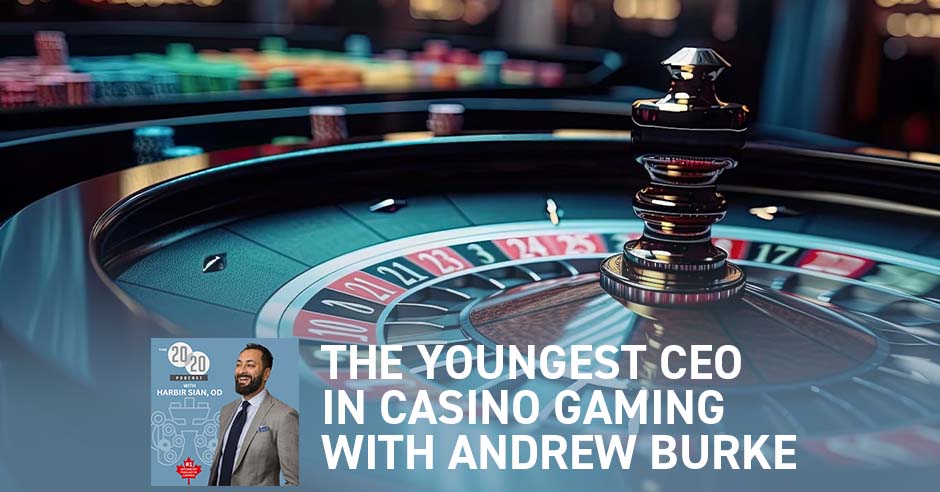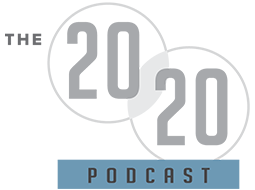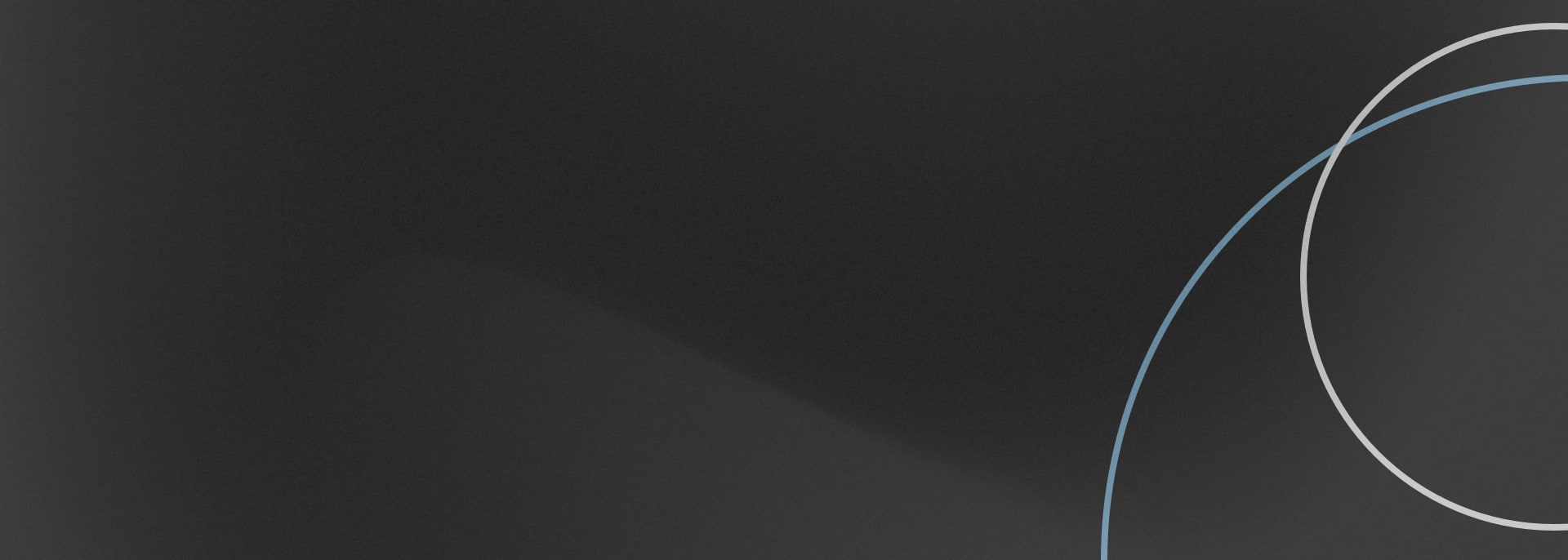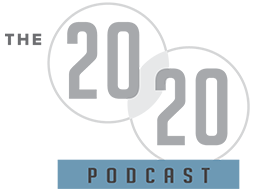
What do slot machines have in common with the eye care industry? Andrew Burke, the CEO of Bluberi Gaming, shares his journey from working in private equity to helping build up a successful gaming company to now saving a smaller company from the brink of failure to making multiple millions in sales every year. At the heart of Andrew’s story are lessons that display how there might be more similarities than you would imagine between gaming and eye care. The struggles he faced in growing a business and keeping it thriving could offer you a fresh perspective in taking your clinic to the next level, no matter what comes your way. Tune in now and gain both inspiration and insight from the youngest CEO in the casino gaming industry.
—
Watch the episode here
Listen to the podcast here
The YOUNGEST CEO In Casino Gaming – Andrew Burke
Thank you so much for taking the time to join me here. I’m so excited to be back in 2024, rocking it here. We’re on a roll with our episodes. We have great guests lined up, and this is no exception. This is a great one because I have somebody who’s from outside of eye care who’s going to be able to give us so much insight into being a CEO, building a business, and the challenges that come with building a business in a different industry.
I have Mr. Andrew Burke who is the CEO of Bluberi Gaming, and Bluberi Gaming makes slot machines for casinos all across North America. He is the youngest CEO in this industry. He’s going to share a lot of insights into how he got to where he is, what he’s had to go through, the struggles, the challenges, COVID, how it’s affected the business, and all of this stuff. He’s going to also share his values. One of the key things I want to get to at some point during the conversation is the core values that Andrew developed at Bluberi that have helped them succeed. Thank you, Andrew, for joining me here. I appreciate having you.
I’m happy to be here. Thanks for having me.
Let’s put a little bit of context in the conversation. We met at Vision Expo West in Las Vegas. I interviewed you there, which was a great opportunity. I’m glad to have done that. We got to know each other. I got to learn a lot about you. I thought you would be such a perfect guest for the show, given everything you were sharing at that meeting. Why don’t you give us a little bit of background on yourself? Tell us where you’re from, what you do, and how you got to where you are.
Thanks again for having me, Harbir. I enjoyed our conversation in Vegas. I’m glad to expand upon it. I started my career in the private equity industry. I grew up in Ohio and then moved to San Francisco in 2006. Moving to San Francisco from Ohio is a little bit like moving to Mars. It was a complete culture shock for a kid from Ohio to move there. I’ve worked and lived downtown. It was a total change in my life in many ways. I started working at a private equity firm called Alpine Investors.
Before I talk about my career, one of the things I’ve learned is that a lot of young people, and I was no exception to this, focus on their titles and the amount of money they’re making in the early days but what you should be focused on is the skills you’re developing and the scope of your work. What I didn’t realize by going to Alpine was I was being given this amazing gift to have a tremendous amount of skill development in the five years that I was there. I was given a scope of responsibility way beyond where I should have had for a kid my age and skill level.
The private equity firm was investing money in a ton of different companies, and one of the companies they invested in was a slot machine business in Las Vegas called American Gaming Systems. It’s called AGS. When the stock market blew up in 2008, we stopped investing in new investments and started to entrench the companies that we owned. I went to work pretty much full-time on AGS around that time and focused on responsibilities. I was given a ton of responsibility to open new markets and work on business development. I worked on marketing. I got to work on all facets of the business.
In 2011, the CEO of AGS said to me, “You either want to keep being a private equity guy or you want to be an operator. If you want to be an operator, you have to move to Las Vegas, leave the private equity firm officially, and come work for us.” I did that and moved to Las Vegas in early 2011. From there, AGS was eventually sold to a company called Apollo, which is one of the largest private equity firms in the world. I stayed and ran the slot division. AGS eventually had slot machines, table games, and online gaming or interactive games. I was the general manager of the slot business.
We went on a very successful run and grew the company from $50 million in revenue to $356 million in revenue, and 100 employees to 800 employees. We eventually took the company public on the New York Stock Exchange in early 2018 at over a $1 billion valuation. It was a pretty amazing run. I learned a ton talking about responsibility and scope and doing a lot of stuff I had never done before.
We spent time being a publicly traded company, which is not my favorite thing in the world. There are a lot of differences between running a public business versus a private one. In late 2019, another private equity firm called me and said, “We have a company called Bluberi, which is another slot machine company that’s based in Quebec that needs a CEO.” I went to work for them on January 13th, 2020.
I had no idea that COVID was coming as a first-time CEO. I’m sure we can talk about that. I’ve been here for years and the business has drastically changed. We have had a pretty significant turnaround from my first year there. We were doing about $10 million in revenue. In 2023, we did $75 million in revenue. It’s a significant growth. I’ll finish up my long-winded intro. I’m a father and a husband. I have two daughters who are 9 and 6 years old. My wife and I have been together since high school. We moved to San Francisco and Las Vegas together. Family is an important part of who I am and my journey as well.
That was not a long-winded intro. That was great. You hit all the highlights real quick. I forgot to mention off the top that you’re a girl dad like me. That’s a nice little connection. I also love the Canadian connection that you’re the CEO of a company that was founded in Canada and has offices in Quebec and New Brunswick. That’s cool. Do you come up to Canada much?
I’m up there at least once a quarter. The private equity firm that owns us is based out of Toronto. I’ve spent some time in Toronto. I’ve spent a lot of time in Montreal. Our office is in a town called Drummondville, which is halfway between Montreal and Quebec City. We opened an office in New Brunswick. I haven’t been there yet but I’m looking forward to my first trip. I’ve spent a lot of time in Canada. I love it up there.
Have you learned French?
My French is very bad. I like to say that I grew up very close to Kentucky. My English is also very bad. I could barely speak English but I’m learning. I’m picking up. Quebecois French is very fast. That is for sure.
There’s a lot of slang and stuff like that. They will say something but they won’t say the word. It happens. Everybody has their little dialect.
I do find myself sitting in meetings where everyone will switch to French, and I can follow along. I know what’s going on because I can understand the context but I’m horrendous at speaking it.
I’ve lived in Canada for 30 years. My French is terrible. Don’t feel so bad.
I’m off the hook there.
Let me go back to something you said there using the word title. There’s an important message that you shared in there. That’s so relevant for us in eye care. A lot of times, younger business people, entrepreneurs, whoever it might be, and professionals get caught up in the title, the acknowledgment, or making the money right out the gate but you were luckily in a position where you got to work on your skillset first and then applied that skillset to become the youngest CEO in that industry and successful at growing your business. That part is so important.
I’m sure it’s across the board in other industries too but in eye care, you could see that there are a lot of people who are coming out of school with debt. We can’t argue the fact that they need to make money. Everybody needs that. You have to pay off bills and be able to live but there’s this movement toward, “Let me make the most money wherever that is regardless of the experience that I’m going to get and regardless of whether it’s going to help me build my skillset.” I’m wondering if you can hammer down a little bit on that, why that’s so important, and what you might say to somebody if you’re talking to someone like that.
I had this epiphany in my late twenties. I wish I would have had it even sooner than that but in my early twenties, I thought, “I’m this kid from Ohio who moved to San Francisco where the cost of living is big. I have to make as much money as possible and start my life. The only way to be rich is to be aggressive or whatever it is.” During my late twenties, I had this light bulb go off that it wasn’t about short-term money because money in your career isn’t linear. It’s exponential. It starts slow, and then over time, it jumps and goes like this.
The thing that it’s correlated to that I realized was your skillset. It’s not correlated to necessarily your title or job. Maybe you could bump it up the ladder a little bit by jumping a job here or jumping a job there but ultimately, what happens is somebody says, “That person’s skillset is something I cannot live without. As a result, I’m going to pay them a lot for it because they’re the best at whatever that thing is that they do.”
Your skill set is not necessarily correlated to your title or your job.
I’ve spent the last few years of my life focusing on my skillset and thinking, “I’m going to be the best executive in the gaming space that I can be. Eventually, somebody will reward me for that and give me an opportunity to prove that my skillset matches what I think it does.” That’s what happened to me over time but I had been focused on, “Is my title big enough to get the next role?” People didn’t give me the CEO job because of my previous title. They gave it to me because of the results of my last job. It’s about focusing on your skillset, the scope of your responsibility, and ultimately the results that you produce there.
It’s nice to know that has worked out for you in your scenario there. It seems to be working pretty well. To be honest with you, I have been there myself. I’m sure many of us come out of school and start making money. Those dollar signs look attractive. You feel like that’s the only thing that matters but as you start going through it, you start to realize that building your skillset, doing something fulfilling, and building a career that fulfills, that’s satisfying. You look forward to going to work and you’re making a difference. Those things start to matter more.
The money tends to follow once you’ve got those other things in place because you love what you do. You’re going to put more into it. You’re going to be passionate about it versus checking in and out. You have to do that for 20, 30, and 40 years of your life. You don’t want to be clocking in and out every day. You’re not going to put everything into it at that point. You’re looking forward to leaving.
One of the things that I’m passionate about is trying to make sure our profession or industry continues to grow in the long-term. If we keep having more people coming into the industry who are just clocking in and out, and they’re not going to put that extra effort in to grow the industry, that’s going to have a negative effect on our profession in the long-term.
I mentioned that a couple of times already here. Let’s talk about being the youngest CEO in the slot machine industry or the slot machine business. You’re probably dealing with some big companies, pretty aggressive CEOs, and other business people. How has being the youngest been a positive? Has it been a negative for you in this space?
It’s not a testament probably to my skillset and ability to get somewhere fast because I’m not that young. Our industry is a bit behind the curve on other industries in terms of having younger leaders promoted into bigger positions. I spent some time at my old private equity firm in Alpine. I was walking through their offices, I felt like a dinosaur. I felt like the oldest guy there. It was all these young people in these brightly lit offices and corners. I’m sure they were doing pretty well.
Our industry is evolving. The place that it helps me is that there’s a lot of young talent in our business who want to work in a different place. The generations are shifting. What a 60-year-old CEO expects out of his employees is different than what a 40-year-old CEO expects out of their employees. Good or bad, it’s different. One of our core values is called the New School. Bluberi is a very new school. We do a new-school approach to everything we do and I’ve been able to bring that to it.
I’m in these meetings where I’m the youngest person but I don’t let that faze me because it’s back to that thing we talked about. I’m very confident in my skillset and ability in the business. I’m pretty sure there’s a problem that you can’t ask me within this space that I don’t have some thoughts on. I stand tall in those meetings and those types of things but I’ve also found a lot of great mentors in the space who have been, done, and seen things that I haven’t seen yet. The older you get, the more you appreciate that experience and say, “I would like to learn some of these stories from some of these folks that went before me.”

Tell me about how important mentors have been and how you’ve gone about finding mentors for yourself.
I’ve never been shy about reaching out to people and saying, “I would love to have coffee with you. I would love to pick your brain on this thing.” I’ve done that in my entire career even when I was in my early twenties. You would be surprised about who would respond to you and take your meeting or take your lunch. Go into those meetings with questions. I’ve done that for a long time. I’ve been lucky to have a lot of great folks in the gaming business who have come a long way in this space, have seen a lot of great things, and have helped me along my journey.
I have some folks from outside the business like my old private equity firm. When I have a problem I’m tasked with, I can call them and say, “Here’s this thing I’m working on.” I have an amazing peer network. I have another CEO in the space of gaming who’s roughly my age. He’s a little bit older than me but he and I talk pretty frequently about challenges in the business or challenges that we’re facing. I have some other friends who are CEOs of other businesses. We talk regularly about problems unrelated to our business but they’re all the same challenges and things we’re facing.
First of all, I agree that you would be surprised at how many people would take you up on stuff like that. From my experience, I’ve noticed that too. Having the initiative to reach out to someone often goes a long way. I was speaking with a pre-optometry student. When somebody like that reaches out, I acknowledge the fact that they took the initiative to reach out and ask questions or ask to come in and shadow or whatever it might be. That’s always nice.
I’m always willing to give my time in that scenario, and that has been the case with others as well. Are you approaching that with anything specific that you might say? Let’s say you’re going to somebody who’s got a few years of experience on you, 10 years or 15 years ahead of you. The thing I’m getting at here is humility or anything else that you’re looking for or approaching that conversation to ask them to speak with you.
I’m a lifelong learner. I always think you can learn something from every conversation and interaction that you have. I generally have a pretty specific thing I want to talk to people about, “I would like to talk to you about this phase that my business is in. I know that you did this at this place. I have some questions for you about what you achieved here.” I’m always trying to think about what things could I be doing differently at the business that somebody else has already tackled. I’m trying to get their experience.
You can learn something from every conversation and interaction that you have.
It’s important to have a specific idea of what you want out of those conversations. You will be shocked by what you will get. You will get great answers and people who say, “It was years ago. I haven’t been running this business. You’re in it. You have a better handle than I do.” That gives you confidence too, “This person is not critical of what I’m doing.” They’re saying, “I can see you’re doing great.” You get some of those interactions and they’re helpful for a number of reasons. They give you the confidence that you’re on the right track or they give you something to think about or something critical.
That’s a great piece of advice to go into that very specifically, “I would like to chat with you about this specific thing,” versus, “I would like to pick your brain about stuff.” That puts people off a little bit because then that might end up being a two-hour conversation that’s not that fruitful.
All these people are busy. Even if they’re retired and have made a lot of money, they have plenty of stuff they want to do. You say, “I have this specific thing. Let’s talk about it.” You get a good response.
You started as CEO of this relatively small company in gaming at the beginning of 2020 a few months before the world shut down. Slot machines, from what I remember, require people to be there physically in person to be used. What did that look like? That’s crazy. First of all, stepping into a company like that but then having everything shut down, what did that look like to you?
It was sheer terror. I came in and the company was already a turnaround. We were already financially trying to make things work with a limited budget. I was in Toronto to see our investors on a Monday, and then I went over to Quebec to see our offices on Tuesday and Wednesday. By Friday, everything was shut down. I had flown home and there was nobody at the airport. I thought, “What are we going to do? Maybe this thing is not going to make it. Maybe we’re going to go under.” After you get over the terror of that, you start talking to some folks.
I called my old boss at my previous job. The CEO there is a guy named David Lopez who’s about ten years older than me. He said to me, “The best thing about this is nobody has a playbook. Whatever you do, it’s going to be okay. There is no right or wrong answer here.” That gave me a lot of confidence to go, “He’s right. There’s not a playbook here.” We dug in. It became a blessing in some ways to our business because we needed to reset things pretty hard. I’m not sure we would have gone as quickly to make some of the decisions that we made without the terror of COVID hanging over us.

We made some hard decisions quickly in terms of rightsizing our workforce and moving functions from the business. When I started, most of the business was in Quebec. What I wanted to be in Quebec was our game development and talent around technology because there’s a rich technical talent pool in Quebec particularly with companies like Ubisoft being based in Montreal.
We moved all the manufacturing, sales, HR, finance, accounting, and everything to Las Vegas during the pandemic to reset expectations. We then started attracting talent, which was an easier time to do it because people were furloughed from companies and they were feeling disenfranchised. We were able to find some talent to join us during that time because they didn’t like whatever way COVID was being handled at their company. A lot of people felt that way.
This is not me pandering to Canada here but the Canadian government handled the pandemic in a financial way better than the US did. The programs they had around keeping employees employed helped our company keep going. That was a huge benefit and it woke me up to the benefits of having a company that’s multinational and working across borders.
We came out of the pandemic. Every casino was shut down for about two and a half months, and that was also terror. There was no revenue coming into the business but we were able to rightsize the business and get it focused. We kept investing in R&D developing new games during the shutdown. We came out of the other side of that a much stronger and leaner company once we got our bearings.
I’ve learned a lot being in this role but executives and CEOs sometimes lie to employees unintentionally. You don’t know that you’re lying when you say the thing you say but later on, you realize, “They could think I was lying about this thing because I said this and then we couldn’t do that. We couldn’t live up to it.” Those types of interactions made me much more thoughtful about the way I communicate with the company. It made me much more thoughtful about how I work through very stressful problems. I try to give as much clarity to our employees as we’re working through those things.
I learned a lot of lessons that I don’t think you could learn any other way other than having gone through that. I’m thankful that we went through that and that it was a great learning opportunity for anybody running a company at the time. Nobody wants to have to go through a horrific thing like COVID but maybe I’m an optimist by nature. I always try to find the bright spots.
That’s amazing that you did that. That’s incredible. You already came into a company that was financially struggling, and then everything shut down but you use that as an opportunity to turn it around to make those hard decisions. That’s a great point because if COVID hadn’t happened, some of those decisions might have been pushed down the road, “Kick the can down the road. Let’s wait until the time is right.”
They weren’t dire, “This is not killing us,” but we were better off for having said, “We’re going to do this hard and fast.”
One of the biggest knocks on optometrists from within, not from outside, is when we come out of optometry schools, we’re not trained in business. Many of us want to be business people. We want to own our practice and run this and that but we get very little training in it. Let’s say from that lens, we have some optometrists and other people in the eye care industry here who are business owners and want to strengthen that business acumen a little bit. Coming into a business that was financially not doing as well and not as healthy as it should be, what’s the first thing you look at? What are some of the first decisions you make? Regardless of COVID, when you first walked in the door in January 2024, what did it look like?
I have a background in finance. The first thing I always do is ask for financials and the state of the financials. Forget about what they say, what the revenue number is, or what the profit number is. It’s the state. How hard are they to produce or how difficult are they to get tells me a lot.
It’s the financials themselves and the numbers on the paper, “How quickly can you produce them for me?”
If I said, “I want to see the financials of your practice,” and it took you two weeks to get them to me, I would be like, “That’s not great. Something is going on.” When I got to Bluberi, it was a little bit like that. I would ask the question and people would go away for three days, come back, and go, “We think it’s this.” I was like, “Let’s get to a place where we can get that answer a lot faster and quicker because what you realize is people aren’t looking at things the same way I would look at them.” It takes a little time to get reporting but the ability to pull a report and get it in an organized fashion quickly is step one.
If you struggle with that, you’re not alone but there are a lot of companies out there that can help you with that. There are lots of consulting firms and folks that can help you get that data pulled together quickly. It starts with having a smooth reporting process where you’re consistently getting information. I like to get information every week. I would settle for monthly if I couldn’t get monthly. You have a key set of things you’re looking at plus the financial data and data underlying the business.
If I were an optometrist, maybe it would be like, “How many visits or appointments did I have this week? What was the average bill for each one of those folks?” You would find the key things that you would want to look at on a regular basis and make sure in real time you could see them because that would help you make changes to the business. If you’re seeing things like, “I got my data this week but it was for two months ago,” it’s hard to change anything.
I’ve worked with a ton of founder-owned businesses in my career back from my time at Alpine but I do find that a lot of times, the data and information aren’t the priority of the founder of the company. In your case in optometry, you’re a technician. You’re a specialist doing a thing. You have a full-time job doing that and then another full-time job running a business. Generally, they’re either pretty heavily weighted on one side or the other of those two things or they are brilliant inventors of some sort. They have invented this thing, and this thing is a magic cure. That’s the thing they’re obsessed about but they don’t care about the details of all of that.
I’ve had a lot of success in my career going in and helping those people get focused, “Who’s in charge of the data? How do we get that in the right place?” People who are curious about business should take some business courses. Harvard offers a class. It’s called HBX through Harvard Business School. It’s a pretty intensive short financial training program that I send a lot of times to young sales executives who want to learn more about business. Things like that are great resources that you can find to increase your business acumen. It’s a lot easier to learn the business side than it is to learn how to be an optometrist.
Optometrists might beg to differ. As an optometrist, we go to school to learn science stuff. We do 4 years of undergrad and then 4 years of optometry all in science stuff. That comes a bit more naturally to most of us. Once I start looking at numbers, for sure, my eyes start to gloss over a little bit. I’ve been trying to put more effort into it over the last however many years but probably taking a course like what you’re suggesting there, the HBX or whatever that Harvard Business course is called, is a good idea. I have some friends who have done that. I have a couple of friends who have done MBAs. They have gone out and done the whole thing, which is insane to do that. It’s a lot of work but I imagine that they’re going to do very well for themselves.
As I’ve gotten older in my life, I spend a lot less time being insecure or worried about the things I’m not good at and focus a lot on the things I am good at. The way I solve the things I’m not good at is I find the right people to do those things. That would be the best advice I could give anybody in your business. No matter how hard you try, if you’re never going to be as passionate about the numbers, find somebody who is. Find somebody that you could partner with who will take that off your plate and make that easy for you. Don’t have a ton of anxiety or self-doubt about your inability to do that thing because ultimately, you’re great at this other thing. That’s the thing that makes all the money anyway so focus on that thing.
When we chatted in Vegas, a big part of that conversation was talking about the core values that you developed when you came to Bluberi and how important that has been in growing the business. I would love to at least quickly go through all of those and share why they’re important to you. I was impressed by the core values. I took a couple of those and started to unofficially implement them in our practices as well. Why don’t we jump right in? Why don’t you go ahead and share those?
First and foremost about core values, a lot of times, companies say, “We need core values,” and then put together a list of eight words like integrity, pride, or hard work. It’s deeper than that. To me, core values are like, “How do you want people to show up at your company every day? How do you want to show up? How do you want everybody else at your company to show up? How do you want customers to perceive you?” In conjunction with the company, myself, and our executive team, we spent probably 100 hours going through and understanding what would be good core values for us. We ultimately developed a set of them. I’ll walk you through some of them.
If you came to our company and went for a job interview, my goal would be that you would hear those come up naturally in the conversation. I see it happen a lot when I’m in. People will say, “That’s a new-school moment. This is a new-school way to do this.” They have changed their language to incorporate them, which is a sign that you’re doing it successfully.
The other thing before I expound on them is we didn’t do it the first day I was there. It took a full two years before we implemented them because when I first got there, I didn’t know what Bluberi was. There was so much change. The core values have to be organic. You build them. They can’t be words on a piece of paper that you wrote. They have to be authentic.
Walking through our core values, the first is the New School. The New School is the number one core value at Bluberi. It’s probably our primary one. We always are trying to think through ways, “Is there a new-school way to do whatever that is, a job interview, your first day, being onboarded at the company, or the way we interact with customers?” That has permeated throughout our business in a pretty meaningful way. Most competitors would describe us as different than everybody else.
The next one is Find It, Fix It, and Own It, which is our sense of ownership. If you find a problem in the business, it’s not enough to just find it. You have to then get it, fix it, and bring it through an outcome. When people bring up problems, they will say, “This thing is broken.” Somebody will say, “That sounds like a Find It, Fix It, and Own It mentality. Why don’t you see that all the way through?”

The next one is clarity and transparency. Those are very important to me. When I started at Bluberi, one of the most shocking things to me was how disconnected the average employee was from the current situation of the business. Most of them thought the business was doing well because the previous executive team had said, “We have this great thing going.” I came in and was like, “That’s not what’s going on. We’re in trouble.” People were generally shocked by that. I thought nobody should ever feel that way. They should always know where they stand.
We’re always trying to be as transparent as we can. There are some things you can’t be transparent about. If somebody came to me and said, “I would like Harbir’s social security number,” I can’t give you that. We’re trying to be as transparent as we can be. Clarity is a big one. A lot of times, people are held accountable to standards they don’t understand. We’re making sure we’re always clarifying with people their goals. What we are trying to achieve with this thing is important. That causes you to have to over-communicate. It’s important.
There are some others but probably the last one I’ll talk about is this. Celebrate wins but never be satisfied. This was an interesting one because it got into the language barrier that sometimes we had with Quebec and the US where somebody was like, “Does that mean that you are never satisfied with us? The executive team is never satisfied with us.”
The example we use is it’s like an Olympian who wants to beat their records. You might set the world record in whatever this thing is but next time you’re out there, you want to beat that record. That’s what we meant by never satisfied. We have to enjoy the success when it’s happening but we always want to push for more. We always want the ability to go, “People thought of us as the best this year but we can do even better next year.” We always try to push that at the company.
I tell a lot of people that I want Bluberi to be the best job that they have ever had but also maybe the hardest job that they have ever had. If we’re doing it right, it should stretch all of your skills. It doesn’t have to be this pressure cooker where everything is miserable to do that. You can have peak performance and not feel like you’re going to die in the process of it, get fired every day, or anything like that. I want people to feel like they can do their best work safely at Bluberi.
You can have peak performance and not feel like you’re going to die in the process of it.
To that very last thing, a good job or the best job would be one that does stretch you and makes you grow and push your comfort zone a little bit or whatever it might be because going back to what I was saying, if you want fulfillment and satisfaction out of your work, you’re not going to get it if you’re bored at work or you’re doing the same thing every day. That’s not going to be the best job. You want to get compensated for it. You want to make sure that you’re rewarded, recognized, and all of that but you have to make sure it’s fulfilling work.
Let’s go through those again, New School, Find It, Fix It, and Own It, transparency, clarity, and celebrating the wins but never being satisfied and not becoming complacent. Those are all good values to have. One of the optometrists that I look up to has a big, busy, and successful practice. It’s one of the things he shares about having those clear goals and metrics that he’s holding everyone accountable to.
He’s super transparent with all his numbers. He is like, “Here’s my P&L. Go ahead and have a look to see where we spend all our money.” He says that’s worked well. He has 8 or 10 doctors and 40 or 50 staff. You have to start to implement something like that. That helps to build a culture. Taking a step from value to culture helps develop a good culture too because everyone knows that they’re being held accountable. Nobody is dragging their feet or riding somebody else’s coattails. That’s important.
People support what they help build. If they know what they’re building and what the results are, they’re more likely to buy into whatever that is.

Wrapping up, there’s 1 question I want to ask you that was on our list of questions, and then 2 questions that I ask every guest who comes on the show. The last thing I want to ask you here is this. What advice you might give to aspiring business people and entrepreneurs out there who are trying to get into more of the role that you’re in here running a business?
There are two things I would say and we touched on it. I would focus on your skillset. Do an honest self-assessment of yourself. What are the things that you are not good at? What are the things you’re good at? Figure out ways to take the things you’re not good at and make them a little bit better. They don’t have to be the things you’re the best at but then double down on things you’re great at. That would be my first advice.
One of the exercises I do for myself is I try to think, “If a new CEO started tomorrow morning, what are the five things that he would say I’m doing a terrible job at?” There are always 5, 10, 20, and 30. Anybody could come into my job and be like, “I can’t believe this guy was doing that.” That’s a good exercise for anybody in their career to go, “If somebody else new took over my job, what are the things they wouldn’t like?” Write down five things, and that will keep you sharp.
It’s patience. Have a long game. You have to be ready for the moment when you get it. You’re going to catch a lucky break. I’ve seen a lot of people get big responsibilities too early and not be ready for them. They never were able to recover from those mishaps that happened in their early 20s, late 20s, or something because they thought they were ready for something, and they weren’t. Make sure you’re ready. When you’re ready, be confident in your ability and maximize that.
Before we go into the last couple of questions, how could people learn more about Bluberi or connect with you if you’re open to that? What’s the best way?
I’m on LinkedIn. I’ve got a pretty active profile. Reach out anytime. Bluberi.com is our website. You can check us out there and follow us. We have a pretty aggressive social presence as well.
Thank you. There are two questions that I ask everybody. Number one, if we could step in a time machine and go back to a point in your life where you were struggling, what advice would you give to younger Andrew at that time? If you’re open to it, you can share what that experience was but more importantly, what’s the advice you would give to yourself at that time?
I remember exactly when it was. It was right when I first moved to Las Vegas in 2011 or 2012. I didn’t like what was going on in my career at the time. I felt like, “Maybe I made a mistake leaving the private equity firm to come here.” I didn’t see that the business was going to be successful. I got pretty complacent for about a year. If I could go back and talk to my younger self, I would say, “Stop feeling sorry for yourself. Double down on your hard work and work ethic.”

I spent a year coasting and going, “What do I want to do with my life? I’m feeling sorry for myself.” I wish I could go back and say, “You have so much time ahead of you. You are so young. Get it together and get focused.” I eventually did that. It took time to get out of that. People in their late 20s and early 30s think they’re old. I try to tell myself, “I’m not old. I got a lot of time.” You got a ton of time. Make the most of it.
That’s great advice. People are saying this but this is a cool thing to say. I’ve been waiting to use that in my show. I’m going to double-click on that. You and I are the same age. I hear this all the time because we have staff who are in their 20s and 30s. We have young doctors who work for us who are turning 30 and they’re like, “I’m old. I’m 30.” I’ve talked to them. I’m like, “You’re so young. You have no idea. Do not take your foot off the gas at all. That little bit extra that you keep your foot on the gas is going to compound. Compound interest is not just a financial thing. It’s in life too. Everything you do is going to compound.”
I did that too in my mid-30s. I got a little lazy with working out and all of this stuff. In my late 20s and early 30s, I was in good shape and then I started to get lazy. It’s harder to get back to that good shape or place wherever you are mentally and physically. Stay on it. I’m trying to remind myself that. I’m a father of three. I could be like, “I’m a dad. I’ll have a dad bod.”
I tell people that all the time. I say it to myself too. The best advice you could get, and it applies at any age, is to tell yourself this. You are the least busy you’re going to be in your life. To twenty-year-olds, that’s true but even for us. We both have girls. Our girls are getting older. They’re only getting into more things. They’re only going to more after-school events, weekend stuff, and performances. Our lives are only getting more complex, not less complex. If you can set your mind around, “Today is the least busy I’m going to be in my life,” and set your intention on that, you can unlock some powerful thinking in your brain.
You are the least busy you’re going to be in your life right now.
When people think they’re old, this is the youngest they will ever be again because we’re only getting older. That’s another way to flip that script a little bit and be like, “I’m only going to get older. I better get things in here.” Thanks for that insight there. The last question I like to ask every guest is this. How much of everything you’ve accomplished to this point in your life is due to luck and how much is due to hard work?
I had some luck. I spent a lot of time trying to think about what was lucky and what is skill-based in my life. It’s particularly relevant in the slot machine world. Chance is a big thing but people take too much credit for things that are luck in their lives. When I was young, I believed in the idea of the self-made man. When I was a kid in Ohio growing up, I was like, “You can make it and do it,” but that’s not what happens. What happened was somebody gave you a chance and an opportunity because of where you were in your life, the way you grew up, or whatever it was.
You had some advantage and somebody gave you something. The question is, “What did you do with that thing that they gave you? Did you screw it up? Did you make it work?” I’ve tried to be very mindful of that particularly as I’ve gotten older, “You’re going to catch lucky breaks. You should recognize that they are lucky breaks but then you should maximize them.” I’ve had plenty of lucky breaks, to name a few, getting a job at a private equity firm out of school. I went to a state school. That is not something normal and happens. The owner of the company had a connection to my school. That was luck.
Our company at AGS was bought by one of the largest private equity firms in the world. This company Apollo invested a ton of money in the business and gave me a lot of opportunities. It was a weird deal for them to do. That could have gone in a very different direction. There are so many of those things that could have gone left or right. I joke with people at work and say, “My biggest skill is luck.” That’s my thing. I tell them, “The thing I’m the best at is being lucky,” and I believe that. You’re going to get lucky. Take advantage of it.
I didn’t think about the irony of asking you that question, the CEO of a company that builds slot machines. How important is luck in your life?
That’s my whole life.
It’s nice to hear that from your perspective. Hard work has to play. You double down on your skillset. If you didn’t have that skillset, then the luck is irrelevant. You’re not going to be able to move forward in that profession and industry. Sometimes we overlook the fact that there were opportunities that presented themselves that were the universe.
It’s okay to be lucky too.
That’s the other thing. There’s a negative connotation to luck.
Sometimes people want to make sure that everybody knows that they did this thing. You did some part of it but you also got lucky. The luck thing is okay.
Thank you, Andrew. Are there any last words you want to share before we wrap up here?
I’ve enjoyed getting to know you and spending time with you. I appreciate it. When I got the call originally to speak at The Vision Council, I was like, “I would love to do it but I don’t know enough about it.” It’s awesome to get different perspectives and hear different things that people in your industry are working on. I appreciate the chance to come on here and talk to you about it.
Thank you so much. I know you’re busy and you have lots going on. The fact that you took the time out to come and share your insight is amazing. The feeling is mutual. It was cool to be able to meet you in person. The energy was great there at that meeting. Thank you for taking the time to do this. Everybody, please make sure you check out Bluberi. Learn a little bit about what happens behind the scenes when you go to a casino. Andrew Burke is the CEO there. Feel free to reach out to him on LinkedIn. Andrew, thanks again for taking the time. I appreciate it. Thank you to everybody who’s reading this. I will see you in the next episode.
Important Links
- Bluberi Gaming
- LinkedIn – Andrew Burke
About Andrew Burke
 Andrew brings with him over 15 years in gaming and private equity experience. Prior to his position, he served as the Senior Vice President of Slot Products at AGS where he was the mastermind behind implementing strategies that helped get games like Colossal Diamonds into nearly EVERY casino. Keeping his sights set on achieving greater growth within our company, Andrew aims to bring his big-vision ideas to life and straight to the casino floor for years to come while putting Bluberi on the map. When he’s not busy exceeding everyone’s expectations, this voracious reader is always ready to recommend an influential book, sporting the newest sneakers, speaking on his love of street art, or enjoying a family-friendly game of golf with his wife and two daughters.
Andrew brings with him over 15 years in gaming and private equity experience. Prior to his position, he served as the Senior Vice President of Slot Products at AGS where he was the mastermind behind implementing strategies that helped get games like Colossal Diamonds into nearly EVERY casino. Keeping his sights set on achieving greater growth within our company, Andrew aims to bring his big-vision ideas to life and straight to the casino floor for years to come while putting Bluberi on the map. When he’s not busy exceeding everyone’s expectations, this voracious reader is always ready to recommend an influential book, sporting the newest sneakers, speaking on his love of street art, or enjoying a family-friendly game of golf with his wife and two daughters.




